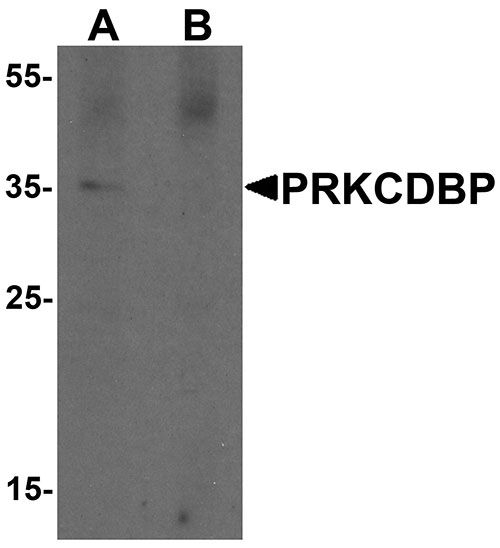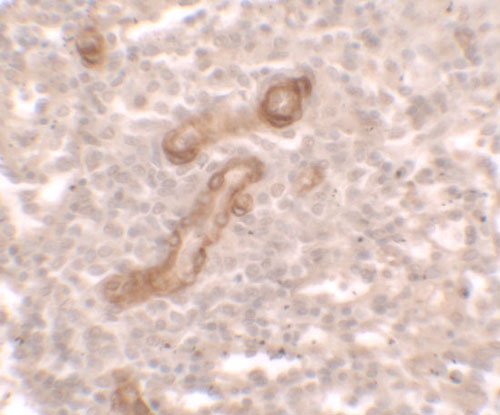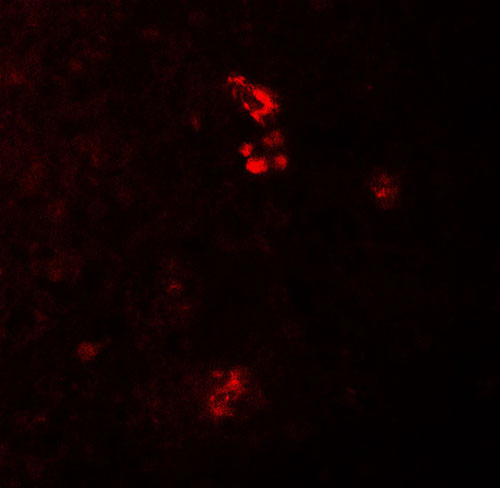PRKCDBP Antibody
- SPECIFICATION
- CITATIONS
- PROTOCOLS
- BACKGROUND

Application
| WB, IHC-P, IF, E |
|---|---|
| Primary Accession | Q969G5 |
| Other Accession | NP_659477, 47132587 |
| Reactivity | Human, Mouse |
| Host | Rabbit |
| Clonality | Polyclonal |
| Isotype | IgG |
| Calculated MW | 29 kDa |
| Application Notes | PRKCDBP antibody can be used for detection of PRKCDBP by Western blot at 1 - 2 µg/mL. |
| Gene ID | 112464 |
|---|---|
| Target/Specificity | PRKCDBP; It is predicted to not cross-react with other members of the cavin family. |
| Reconstitution & Storage | PRKCDBP antibody can be stored at 4℃ for three months and -20℃, stable for up to one year. |
| Precautions | PRKCDBP Antibody is for research use only and not for use in diagnostic or therapeutic procedures. |
| Name | CAVIN3 (HGNC:9400) |
|---|---|
| Synonyms | PRKCDBP, SRBC |
| Function | Regulates the traffic and/or budding of caveolae (PubMed:19262564). Plays a role in caveola formation in a tissue- specific manner. Required for the formation of caveolae in smooth muscle but not in the lung and heart endothelial cells. Regulates the equilibrium between cell surface-associated and cell surface- dissociated caveolae by promoting the rapid release of caveolae from the cell surface. Plays a role in the regulation of the circadian clock. Modulates the period length and phase of circadian gene expression and also regulates expression and interaction of the core clock components PER1/2 and CRY1/2 (By similarity). |
| Cellular Location | Cytoplasm {ECO:0000250|UniProtKB:Q91VJ2}. Membrane, caveola. Cytoplasm, cytosol {ECO:0000250|UniProtKB:Q91VJ2}. Note=Localizes in the caveolae in a caveolin-dependent manner. |
| Tissue Location | Skeletal muscle, liver, stomach, lung, kidney and heart (at protein level). Strongly expressed in mammary and epithelial cells. |

Thousands of laboratories across the world have published research that depended on the performance of antibodies from Abcepta to advance their research. Check out links to articles that cite our products in major peer-reviewed journals, organized by research category.
info@abcepta.com, and receive a free "I Love Antibodies" mug.
Provided below are standard protocols that you may find useful for product applications.
Background
PRKCDBP Antibody: The protein kinase C delta (PKC-δ) binding protein (PRKCDBP), also known as cavin-3, is a member of the cavin family of proteins that are involved in caveolin formation and regulation. PRKCDBP was initially identified in a screen of cultured cell lines for proteins that were strongly induced by serum starvation. Studies indicate that PRKCDBP binds not only to PKC-δ but also to caveolin-1 and helps regulate caveolin traffic and function. Similar to other members of the cavin family, the expression of PRKCDBP was found to be down-regulated in various cancer cell lines, suggesting a possible tumor suppressor function of PRKCDBP.
References
Briand N, Dugail I, and Le Lay S. Cavin proteins: New players in the caveolae field. Biochimie 2011; 93:71-7.
Izumi Y, Hirai S, Tamai Y, et al. A protein kinase Cdelta-binding protein SRBC whose expression is induced by serum starvation. J. Biol. Chem. 1997; 272:7381-9.
McMahon K, Zajicek H, Li W, et al. SRBC/cavin-3 is a caveolin adapter protein that regulates caveolae function. EMBO J. 2009; 28:1001-15.
Bai L, Deng X, Li Q, et al. Down-regulation of the cavin family proteins in breast cancer. J. Cell Biochem. 2012; 113:322-8.
If you have used an Abcepta product and would like to share how it has performed, please click on the "Submit Review" button and provide the requested information. Our staff will examine and post your review and contact you if needed.
If you have any additional inquiries please email technical services at tech@abcepta.com.













 Foundational characteristics of cancer include proliferation, angiogenesis, migration, evasion of apoptosis, and cellular immortality. Find key markers for these cellular processes and antibodies to detect them.
Foundational characteristics of cancer include proliferation, angiogenesis, migration, evasion of apoptosis, and cellular immortality. Find key markers for these cellular processes and antibodies to detect them. The SUMOplot™ Analysis Program predicts and scores sumoylation sites in your protein. SUMOylation is a post-translational modification involved in various cellular processes, such as nuclear-cytosolic transport, transcriptional regulation, apoptosis, protein stability, response to stress, and progression through the cell cycle.
The SUMOplot™ Analysis Program predicts and scores sumoylation sites in your protein. SUMOylation is a post-translational modification involved in various cellular processes, such as nuclear-cytosolic transport, transcriptional regulation, apoptosis, protein stability, response to stress, and progression through the cell cycle. The Autophagy Receptor Motif Plotter predicts and scores autophagy receptor binding sites in your protein. Identifying proteins connected to this pathway is critical to understanding the role of autophagy in physiological as well as pathological processes such as development, differentiation, neurodegenerative diseases, stress, infection, and cancer.
The Autophagy Receptor Motif Plotter predicts and scores autophagy receptor binding sites in your protein. Identifying proteins connected to this pathway is critical to understanding the role of autophagy in physiological as well as pathological processes such as development, differentiation, neurodegenerative diseases, stress, infection, and cancer.




